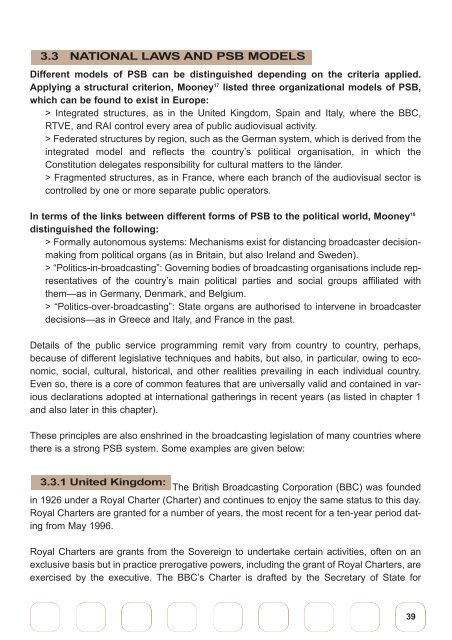Public service broadcasting: a best practices ... - unesdoc - Unesco
Public service broadcasting: a best practices ... - unesdoc - Unesco
Public service broadcasting: a best practices ... - unesdoc - Unesco
Create successful ePaper yourself
Turn your PDF publications into a flip-book with our unique Google optimized e-Paper software.
3.3 NATIONAL LAWS AND PSB MODELS<br />
Different models of PSB can be distinguished depending on the criteria applied.<br />
Applying a structural criterion, Mooney 17 listed three organizational models of PSB,<br />
which can be found to exist in Europe:<br />
> Integrated structures, as in the United Kingdom, Spain and Italy, where the BBC,<br />
RTVE, and RAI control every area of public audiovisual activity.<br />
> Federated structures by region, such as the German system, which is derived from the<br />
integrated model and reflects the country’s political organisation, in which the<br />
Constitution delegates responsibility for cultural matters to the länder.<br />
> Fragmented structures, as in France, where each branch of the audiovisual sector is<br />
controlled by one or more separate public operators.<br />
In terms of the links between different forms of PSB to the political world, Mooney 18<br />
distinguished the following:<br />
> Formally autonomous systems: Mechanisms exist for distancing broadcaster decisionmaking<br />
from political organs (as in Britain, but also Ireland and Sweden).<br />
> “Politics-in-<strong>broadcasting</strong>”: Governing bodies of <strong>broadcasting</strong> organisations include representatives<br />
of the country’s main political parties and social groups affiliated with<br />
them—as in Germany, Denmark, and Belgium.<br />
> “Politics-over-<strong>broadcasting</strong>”: State organs are authorised to intervene in broadcaster<br />
decisions—as in Greece and Italy, and France in the past.<br />
Details of the public <strong>service</strong> programming remit vary from country to country, perhaps,<br />
because of different legislative techniques and habits, but also, in particular, owing to economic,<br />
social, cultural, historical, and other realities prevailing in each individual country.<br />
Even so, there is a core of common features that are universally valid and contained in various<br />
declarations adopted at international gatherings in recent years (as listed in chapter 1<br />
and also later in this chapter).<br />
These principles are also enshrined in the <strong>broadcasting</strong> legislation of many countries where<br />
there is a strong PSB system. Some examples are given below:<br />
3.3.1 United Kingdom:<br />
The British Broadcasting Corporation (BBC) was founded<br />
in 1926 under a Royal Charter (Charter) and continues to enjoy the same status to this day.<br />
Royal Charters are granted for a number of years, the most recent for a ten-year period dating<br />
from May 1996.<br />
Royal Charters are grants from the Sovereign to undertake certain activities, often on an<br />
exclusive basis but in practice prerogative powers, including the grant of Royal Charters, are<br />
exercised by the executive. The BBC’s Charter is drafted by the Secretary of State for<br />
39


